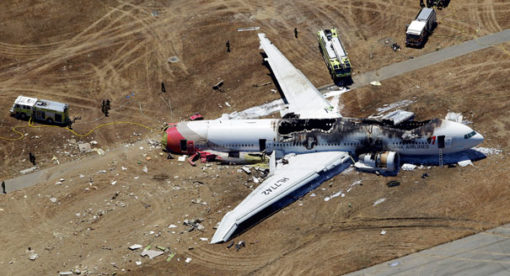Have you guys read Malcom Gladwell’s Outliers? In it is a chapter titled “The Ethnic Theory of Plane Crashes” which explains how the Korean culture — more specifically, its emphasis on hierarchical structure — has made them more prone to plane crashes.
As I’m sure all of you already know, last week, Asiana Airlines Flight 214 crash-landed at San Francisco International Airport. And while my first thoughts centered around the passengers and crew’s well-being (I was especially concerned because my cousin is a pilot for Asiana who regularly makes the Seoul to SF route), my mind also recalled Gladwell’s take on Korean pilots.
And, before I knew it, the media too began to add the Korean culture into a possible contributing factor to the tragic crash.

When Claire saw me looking at pictures of the crash, she said, “Mommy the plane is broken.
Mommy can you put some tape on it?” (image source)
As a Korean-born American whose nationalistic pride (for both countries) remains optimistically high, I couldn’t help but be a bit disappointed by this approach. I knew that human factors must be taken into consideration when investigating such events, and that culture is a part of humanity.
However, I also knew that the NTSB has a lot to go through in this investigation (some say up to a year), and that pointing fingers at an entire culture seemed too speculative at this point.
I was also worried it would add more ignorance and racism to what was already being presented post-crash. 🙁
Still, there was more bugging me. But I couldn’t properly articulate it, and did not have the time to do the necessary research.
Then I came across an article on my newsfeed last night. From the blog Ask a Korean!, a post titled “Culturalism, Gladwell, and Airplane Crashes.”
I know it’s a long read. But I highly, highly recommend that you take a look.
In the article, The Korean (as he refers to himself) not only speaks out against “culturalism” (which he calls “racism of the 21st century”), he points out the numerous errors in Gladwell’s arguments. The following three paragraphs are especially pertinent:
It is not a coincidence that a culturalist explanation runs especially rampant with anything involving Asia. When a massive tsunami, followed by the Fukushima disaster, struck Japan last year, one could not take two (metaphorical) steps in the Internet without coming across a grand explanation about how Japanese culture contributed to the nuclear meltdown, or how Japanese culture enabled the Japanese to respond to the disaster with resolve. Yet no similar analysis ever emerged about American culture or British culture when the BP oil spill–one of the most catastrophic environmental disasters–occurred in the Gulf of Mexico. The supposedly earnest questions about Korean culture and Asiana crash are cropping up now, but when the Air France plane crashed in 2009, killing 216 passengers, nobody even wondered about the connection between the French culture and Air France crash. Why? Because Americans and Europeans are always accorded with the privilege of being treated as individuals, while Asians remain a great undifferentiated mass, unknown and unknowable.And here, we come to the greatest harm that culturalism causes: like racism, culturalism destroys individual agency. Under culturalism, a huge group of individuals are rendered into a homogeneous mass of automatons, eternally condemned to repeat the same mistakes. We still don’t know what exactly caused the Asiana crash. But it is hardly outlandish to think that it was a simple human error. To err is human, as they say–but culturalist explanation robs Korean pilots of this basic humanity. Because of our culturalist impulse, a Korean pilot cannot even make a mistake without tarnishing all other Korean pilots.To progress is human as well. Even without Gladwell’s deck-stacking, it is true that Korean Air had a spotty safety record. Like Korea itself, the airline grew extremely fast between the 1970s and 1990s. Because of its very fast growth, even subpar pilots got a job, and training became spotty. The Flight 801 crash in 1997 did serve as a wake-up call for KAL and Korean government, which regulates KAL. Korean government initiated an aggressive turn-around, and the safety record did turn around. As Patrick Smith of Slate put it, 2008 assessment by ICAO, the civil aviation branch of the United Nations, ranked South Korea’s aviation safety standards, including its pilot training standards, as nothing less than the highest in the world, beating out more than 100 other countries. But if the culturalist explanation is to be believed, none of this matters. As long as Koreans remain Koreans, they will communicate poorly, and they will be more prone to plane crashes.
Is the blog post without faults? Of course not. But it is definitely one that questions a popular position chosen by the western media. And perhaps ones like it are all over the Korean media, but it’s certainly the first I’ve seen written so intelligently in English.
Basically, it’s everything I’ve wanted to say, but with more resolve, articulation, and research.
So if you get a few minutes this Friday afternoon, please head on over. Or bookmark it to read over the weekend. Just take a look, even if to disagree.
P.S. — I know that my link to Outliers is an Amazon Associate link which some people may find hypocritical. The reason I’ve decided to do this is because I genuinely enjoy Mr. Gladwell’s works, and — whether his research and analyses are accurate or not — I believe his theories and conclusions to be worthy of reflection. 🙂






 I like books, gadgets, spicy food, and art. I dislike shopping, hot weather, and the laws of entropy. Although I am a self-proclaimed computer nerd, I still have a love for handbags and makeup... and I am always teetering on high heels. To learn more about me, visit the
I like books, gadgets, spicy food, and art. I dislike shopping, hot weather, and the laws of entropy. Although I am a self-proclaimed computer nerd, I still have a love for handbags and makeup... and I am always teetering on high heels. To learn more about me, visit the 


I don’t think I completely understand what he’s saying, but I think I mostly agree. It’s terrible when people use “culturalism” to write off an entire group of people (ie. Blacks are violent because it’s in their culture) but I’m not sure if I agree that it always comes from racism, per se. At least, there have been times that I’ve heard people use “it’s in their culture” at least as an attempt to empathize with the other person’s situation. Example: Koreans have less violent crime because their culture. This is true and not racist. Maybe I’m not understanding what he means by “culturalism”?
I live in Canada and anybody with a brain refers to the culture of people as a way to speak about the way in which groups of people conduct themselves. By no means am I supporting any sort of prejudice that Asian people may feel afflicted by; however, it is an honest intellectual exercise to understand group behaviour. Additionally, the behaviours of various group do differ from region to region. I know that people in Canada speak of Canadian culture in both positive and negative way. Consumer culture, corporate culture, and beer culture are ones that are usually viewed as negative. By no means do we think that these behaviours help us, but rather we try and recognise how they limit us.